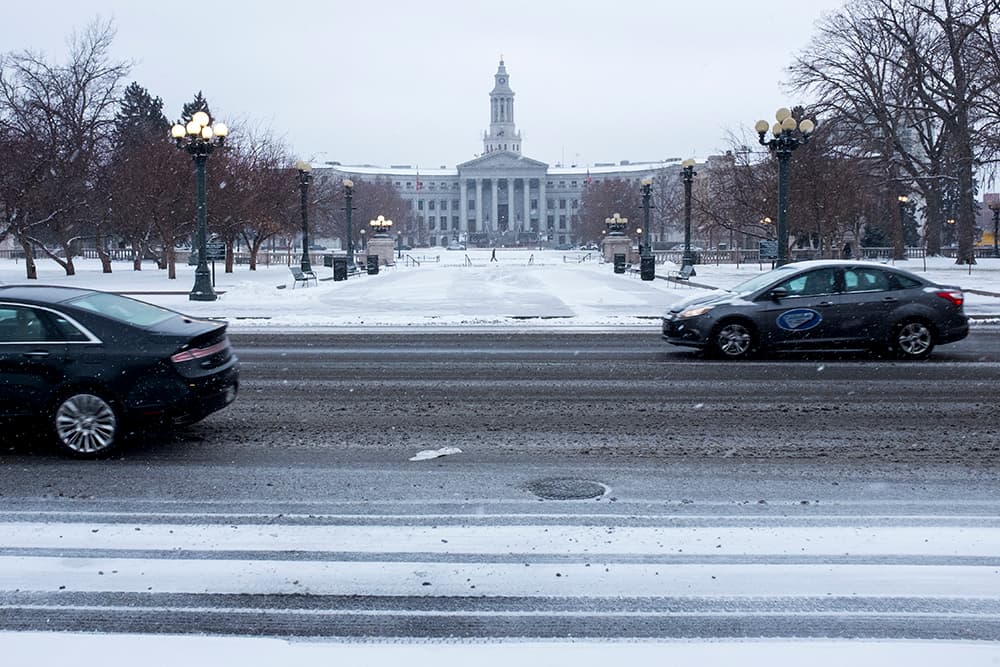The committee that oversees local government ethics has again declared that city officials can't accept valuable gifts from within the city government. Now, they'll wait to see if city officials care.
The big question:
City officials in Denver, including the mayor and city council, are supposed to follow a code of ethics. That code says that the officials may not accept "any money, property, service, or thing of value" if they have any influence over the person giving the gift.
For example, if a construction company was trying to get a contract with the city and gave a bulldozer to a city leader -- well, that wouldn't be OK. Gifts worth $25 or less are OK, though.
The question was whether that same rule applied to gifts given by city agencies. Would it be OK for a city department -- like the airport or public works -- to give gifts to elected officials?
Councilman Rafael Espinoza's office raised that question late last year, asking whether council members could accept gifts such as "scarves, poinsettia plants, geraniums, socks, baseball caps, scarves and coats."
To make his point, he recently showed up at a meeting wearing freebies he'd gotten from the airport.
"He was decked out in, I think it was a hat and a scarf and socks, and what must have been a pretty expensive Spyder jacket, all from Denver International Airport, as gifts to him," said Michael Henry, executive director of the Board of Ethics.
It turned a little controversial.
The city's Board of Ethics decided pretty promptly that, no, it's not OK to take gifts from the people you're overseeing. The city's elected leaders decide the fate of major contracts and projects that are proposed by the city departments.
The city attorney's office objected to this interpretation. In a Dec. 8 letter, the city's main legal department argued that gifts from within the city don't violate the code of ethics.
The letter pointed out the wording of the ethics code, which says that leaders can't accept gifts if "the city has (a) ... contract, business, or regulatory relationship" with the donor. "The City and the department or agency are the same thing," the letter stated, so it's impossible for the two to have that kind of relationship.
Tracy Davis, assistant city attorney, attended two meetings of the Board of Ethics to argue this case, according to the board's director.
In a letter released today, the ethics board stuck to its guns, pointing out that the code is meant to stop people from trying to influence leaders with gifts, and to stop leaders from trying to get presents.
It said that it was an "artificial distinction" to exclude city employees from the list of forbidden gift-givers. The threat of "improper influence, using official office for personal gain, and the appearance of impropriety" apply just as much when it's a gift from within City Hall, the board wrote.
Council reacts:
Councilman Kevin Flynn, who spearheaded recent revisions to the code of ethics, said he agreed with the city attorney's office. He argued in an interview against the idea that city departments had an interest in influencing city leaders.
"I wouldn’t agree that it’s in the parks department’s interest to have this contract with a certain vendor, or to have its annual budget approved — it’s just the normal course of business for the city," he said.
Councilwoman At-large Robin Kniech said that she understood the concern, but she disagreed with the ethics board's opinion.
"I greatly respect that the ethics board has an opinion about whether or not we should accepting or reporting gifts from the city," she told Denverite. But she was closely involved with the recent ethics update, and it was never meant to cover city agencies, she said.
"It is not appropriate for them to rewrite the law. That is beyond the scope of their authority. It does concern me," she said of the ethics board. Still, she added, she's open to a debate about the policy.
Councilwoman At-large Debbie Ortega, on the other hand, said in an email that council's "reporting should include public disclosure on everything received from city agencies."
Who cares?
This conversation didn't begin with a specific complaint. It was a conversation about what is and isn't appropriate.
Similarly, the city attorney's office hasn't said that it's concerned about any department or arrangement in particular -- simply that it wants the rules to be correctly interpreted.
It remains unclear if any officials are getting large gifts from within the city. Speaking to Jon Murray, a DIA spokeswoman said that the smaller gifts were essentially "advertising and promotion for the airport," not an attempt to influence anyone.
DIA also funds trips to places like Heathrow and Amsterdam so council members can "understand what they're talking about," as CEO Kim Day told Ben Markus.
"Travel is not the same thing as a gift, it’s an important tool to learn what other airports and cities are doing in different areas," wrote airport spokesman Heath Montgomery in an email to Denverite.
What's next?
Here's the thing: Even if a specific complaint surfaces, the Board of Ethics doesn't have a whole lot of power.
"That’s the secret of the Denver Code of Ethics. It does not give the Board of Ethics any authority to enforce anything," said Henry, its director.
All the board can do is issue an opinion on whether someone violated the code -- and then suggest that the person's "appointing authority" discipline them or taken another action.
In the case of elected officials, discipline, it's pretty much up to the official and their colleagues to do the punishing, unless they broke a law.













